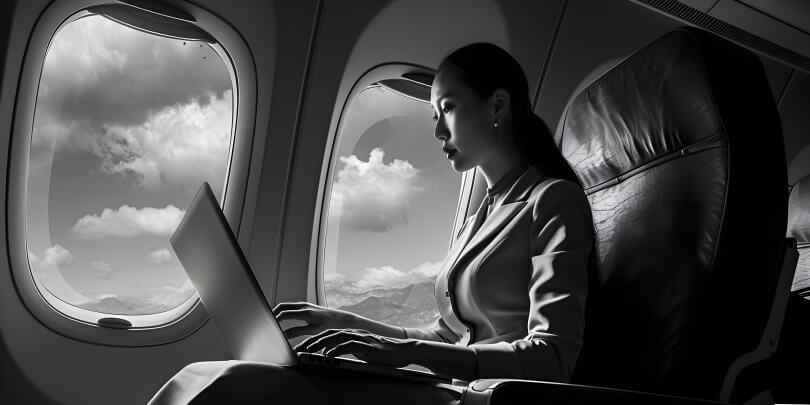Table of Contents
Psychological Perspectives on Dreaming About an Airplane Crash

Interpretation of Airplane Crash Dreams in Psychoanalysis
Dreams about airplane crashes often reflect an individual’s deeply rooted fears and challenges. In psychoanalysis, these dreams can be interpreted through a variety of lenses, drawing from the work of significant figures like Sigmund Freud and Carl Jung. These theorists offer valuable insights into the unconscious mind and the symbolic meaning of dreams.
Sigmund Freud, the father of psychoanalysis, posited that dreams are manifestations of our deepest desires and fears. For Freud, airplane crash dreams could symbolize a fear of failure or a sense of loss of control in one’s life. The crash itself becomes a metaphor for these anxieties, revealing the subconscious turmoil that may not be evident in waking life. For instance, an individual who consistently dreams about airplane crashes might be grappling with stressful situations at work or personal doubts about their abilities.
Carl Jung, a student of Freud who later developed his own theories, approached dream interpretation through the concept of archetypes and collective unconscious. Jung believed that airplane crash dreams could represent a confrontation with the unknown or a significant transition in life. Airplanes, as symbols, can embody human ambition and the desire to transcend limitations. A crash in this context may imply a fear of failing to meet these high expectations. For example, someone undergoing a major life change such as a career shift might dream of an airplane crash, symbolizing their apprehension about their new path.
- Freud’s view that airplane crashes represent subconscious fears of failure and loss of control.
- Jung’s perspective on airplane crashes as symbols of major life transitions and confrontations with the unknown.
- Practical examples, such as stress at work or personal transitions, illustrating how these theories are applied.
Practical Applications in Psychotherapy
These theoretical perspectives are not only academic; they have practical applications in psychotherapeutic settings. Therapists often use these dream interpretations to help clients uncover underlying issues that may be contributing to their anxiety or stress. For instance, a therapist might explore the circumstances surrounding a client’s airplane crash dream to identify real-life fears and challenges. This exploration can lead to strategies for coping with these fears, thereby alleviating the emotional burden they represent.
Unpacking dreams about airplane crashes can provide profound insights into an individual’s psyche, allowing both therapists and clients to address fears and challenges more effectively. By understanding the symbolic language of dreams, one can navigate the complexities of the human mind and foster mental well-being.
Modern Psychological Approaches to Understanding Airplane Crash Dreams
Dreams about airplane crashes can be both terrifying and puzzling, prompting many to seek a deeper understanding. Especially intriguing are airplane crash dreams which compel individuals to confront their deepest fears and challenges. From a modern psychological perspective, interpreting dreams about airplane crashes offers valuable insights into one’s cognitive and emotional state.
One approach is the cognitive-behavioral perspective, which examines how thoughts and behaviors influence dreams. Airplane crash dreams often occur during periods of heightened stress or anxiety. For instance, a person facing a significant life change, such as starting a new job or moving to a new city, might dream of an airplane crash. The dream symbolizes their anxieties and fears about the unknown and the potential for failure.
- Anxiety and stress can manifest in dreams as catastrophic events like airplane crashes.
- Real-life events, such as watching news about a plane crash, can trigger related dreams.
- Addressing underlying anxieties often reduces the frequency of such disturbing dreams.
The Role of Real-Life Events and Psychological States
Airplane crash dreams can also be linked to real-life events and psychological states. For example, someone who has recently experienced a traumatic event may dream about an airplane crash as a metaphor for their emotional turmoil. In this context, the dream serves as a psychological mechanism to process and make sense of their experiences.
Case studies from clinical practice often highlight individuals who, after significant personal loss, report recurring airplane crash dreams. These dreams are interpreted as the mind’s way of grappling with grief and attempting to restore a sense of control. Indeed, grappling with such dreams can offer an opportunity for emotional growth and resolution.
In summary, airplane crash dreams are often reflections of our deepest fears and challenges. By understanding the cognitive-behavioral aspects and the role of real-life events, we can gain valuable insights into our psyche and foster personal development.
Societal and Cultural Implications of Dreaming About an Airplane Crash

Cultural Symbolism and Collective Imaginations
Dreams about airplane crashes often invoke a mixture of fear and intrigue, revealing deep-seated anxieties. In diverse cultural contexts, these dreams are laden with unique interpretations. For instance, in Western cultures, airplane crash dreams frequently symbolize a fear of loss of control or impending failure. This may reflect broader societal fears and challenges, such as economic instability or political unrest. Such dreams can act as a subconscious indicator that one’s life trajectory feels uncertain and chaotic.
In Eastern cultures, dream interpretation takes a different nuance. An airplane crash dream might signify a fear of dishonor or failing familial duties. In societies where communal success often outweighs individual achievements, these dreams can signal a collective anxiety about not meeting expectations or societal roles. The symbolism here extends beyond personal fears to encompass broader cultural narratives of honor and legacy.
Interestingly, indigenous cultures often view transportation disasters differently. Rather than purely negative omens, they may see them as messages from the spiritual realm. An airplane crash dream can be interpreted as a call for introspection and a return to traditional values. These interpretations are often tied to mythological narratives where transportation disasters serve as pivotal moments for transformation and enlightenment.
These cultural symbols and myths underscore how deeply intertwined our dreams are with societal fears. In Western cultures, airplane crash dreams may highlight worries about personal achievement and control. In contrast, Eastern and indigenous interpretations reveal broader societal and spiritual anxieties.
- Western: Loss of control, societal instability, economic fears.
- Eastern: Honor, familial expectations, societal roles.
- Indigenous: Spiritual messages, traditional values, transformation.
Examples from Different Cultures
A practical example comes from American literature, where airplane crash dreams often serve as a metaphor for moral and psychological downfall. Similarly, in Japan, such dreams might appear in narratives dealing with societal shame and the burden of expectations. Indigenous stories frame these dreams as critical junctures, blessing the dreamer with new insights.
These cross-cultural interpretations not only provide fascinating insights into collective imaginations but also underline how airplane crash dreams reveal underlying anxieties and societal fears. By understanding these, we can better appreciate the psychological and cultural dimensions that such dreams entail.
Airplane Crash Dreams in Popular Media and Literature
Dreams about airplane crashes might seem like mere nighttime disturbances, but they can be deeply rooted in various psychological layers, including fears and challenges we face daily. Popular media and literature have a significant influence on how we interpret these dreams. For instance, airplane crash scenes in movies often depict intense, dramatic moments that tap into our primal fears of entrapment and loss of control.
- One prime example is the 2000 film “Cast Away,” where Tom Hanks’ character survives a plane crash and must confront isolation and survival. Such scenes often plunge viewers into imagining themselves in similar harrowing situations.
- The novel “Alive” by Piers Paul Read recounts a true story of survival after a plane crash in the Andes, reflecting the human capacity for resilience in the face of unimaginable hardship. Literary depictions like this resonate because they feel raw and real.
- Another significant example is the TV series “Lost,” which revolves around the survivors of a plane crash on a mysterious island. This show delves into fears and challenges related to the unknown and uncontrollable elements in life.
Influence on Our Collective Unconscious
Popular media shapes our interpretation of airplane crash dreams. These depictions often amplify our subconscious fears. For example, recurring themes of survival and heroism in airplane crash narratives might lead us to view these dreams as a challenge to overcome adversity, reflecting our deepest fears and aspirations.
By understanding how these depictions influence us, we can gain insights into the broader psychological implications of our airplane crash dreams and how they relate to our internal fears and challenges.
Summary
Dreaming About an Airplane Crash can be both unsettling and revealing, as it often reflects one’s deepest fears and challenges. In dream interpretation, these dreams can be analyzed through the lenses of significant figures like Sigmund Freud and Carl Jung, both of whom offer valuable insights into our subconscious mind.
Freud suggested that airplane crash dreams symbolize fears of failure and loss of control. For example, someone stressed at work might dream of a plane crash to represent their anxieties. Jung, however, viewed these dreams as symbols of major life transitions or confrontations with the unknown, such as the fear associated with a career shift.
- Freud’s view connects airplane crashes to subconscious fears of failure and control loss.
- Jung interprets them as symbols of significant life changes or facing the unknown.
- Examples include stress at work or personal transitions, illustrating the theories in practice.
Practical Applications in Psychotherapy
Therapists use these interpretations to help clients uncover underlying issues driving their stress or anxiety. For instance, exploring the context of an airplane crash dream can lead to strategies to address real-life fears. Understanding these dreams can provide profound insights into one’s psyche, aiding in mental well-being.
From a cognitive-behavioral perspective, airplane crash dreams often emerge during periods of heightened stress. They may occur after significant life changes or even after consuming media with airplane crash scenes.
- Anxiety and stress often manifest in dreams as catastrophic events like airplane crashes.
- Real-life experiences, like watching plane crash news, can trigger these dreams.
- Addressing underlying anxieties typically reduces the recurrence of such dreams.
Airplane crash dreams can also have cultural implications. In Western cultures, they often symbolize a loss of control or fear of failure, reflecting societal anxieties. In Eastern contexts, they might represent fears of dishonor or failing in familial duties, while in indigenous cultures, they may serve as spiritual messages calling for introspection.
Understanding these cultural variations can enrich dream interpretation and shed light on the fears and challenges different societies face. By grasping these multifaceted interpretations, we can better address the psychological and emotional aspects of airplane crash dreams.
FAQ – Dreaming About an Airplane Crash
What could dreaming about an airplane crash indicate about your subconscious fears or current challenges?
Dreaming about an airplane crash might reflect deep-seated fears of losing control or concerns about a rapidly changing situation in your life. Such dreams could also symbolize anxiety about achieving high expectations or the fear of failure in a significant endeavor. These subconscious feelings often emerge during times of stress or when facing critical transitions.
What might dreaming about an airplane crash signify regarding your subconscious fears or personal challenges?
Dreaming of an airplane crash can symbolize deep-seated anxieties about losing control in your waking life, reflecting fears that your goals or plans may come to an abrupt end. Such dreams might also indicate feelings of being overwhelmed by high expectations, whether self-imposed or from external pressures. Additionally, they can reveal inner conflicts related to rapid changes or transitions that leave you feeling unprepared or insecure.
What can dreaming about an airplane crash indicate about a person’s subconscious fears or ongoing life challenges?
Dreaming about an airplane crash may symbolize deep-seated fears of losing control or facing overwhelming challenges in one’s waking life. It can reflect significant anxiety about major life changes or fear of failure in high-stakes situations. This type of dream often emerges during periods of stress or when one feels unable to navigate complex, pressing issues.




